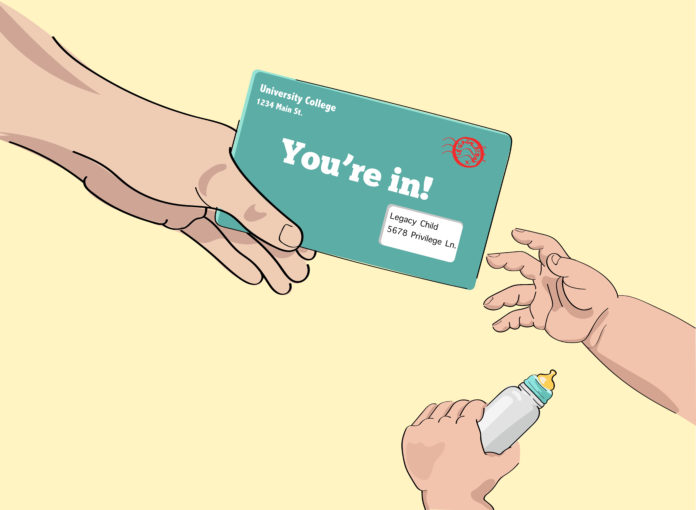As high school seniors around the country await the arrival of acceptance and rejection letters from universities, some may have more reason to feel confident depending on their school of choice.
At 42 percent of private schools and 6 percent of public schools, a student who has a relative that attended the university to which they apply may have an advantage over other applicants, according to a 2018 survey of admissions directors by Inside Higher Ed. These universities consider legacy status as a factor in the admissions process. The way universities handle legacy status has a direct and lasting impact on the make-up of their student body.
The report from Inside Higher Ed explains that universities often cite a desire “to create a multigenerational spirit about an institution” through the consideration of legacy status in the admissions process. However, other universities like Harvard describe the element of legacy status “as a means of fostering a healthy and diverse campus and alumni community,” according to a report from NPR.
This claim blatantly ignores the fact that the consideration of legacy status accomplishes the opposite of diversity. Instead of making room in entering classes for a truly diverse student body composed of applicants from unique backgrounds, identities and cultures, favoring students with legacy status maintains tradition by keeping the same types of people attending an institution. In further insult to the heart of diversity, this type of advantage often favors white, affluent applicants who already have other advantages like attending high school in wealthier school districts.
At Harvard, for example, the advantage legacy applicants have was demonstrated in an analysis commissioned by Students For Fair Admissions. The report analyzed admissions data from 2009 to 2015 and found legacy students had an acceptance rate of almost 34 percent while other applicants had an acceptance rate of 5.9 percent.
At the same time, family legacy connection can benefit a student body in other ways. Most notably, students who have a family connection to a university are likely to feel a greater sense of pride for their college and have a better understanding of its mission before they even step foot on campus as students. This aspect of legacy status is considered in the application process at Baylor University.
Baylor legacies make-up 30.3 percent of undergraduate students, according to the fall 2018 Profile of Undergraduate Students. When hopeful high school seniors apply to Baylor, they are asked to check a box if they have a relative who attended Baylor University.
Jessica King Gereghty, assistant vice president of undergraduate admissions and enrollment at Baylor, explained that in Baylor’s admissions process, legacy status is used as an element of a holistic review of applicants, following a consideration of their academic compatibility with the university.
“Knowing that they’re a legacy really helps us to inform the story from that student that they probably grew up understanding more about Baylor, that their family has a vested interest in them being a Baylor student,” Gereghty said. “And so we think that it adds to their file in term of their mission fit and their contribution to the university.”
While Baylor sets goals for admitting certain groups of students that would diversify the student body, like ethnic background, state or country of origin and gender, legacy status is not accounted for in the same way, Gereghty said.
While considering legacy status in the admissions process can have benefits, it should not be considered to be a diversity-related element. Furthermore, legacy applicants should not be given an advantage over other students that would increase the diversity of the university, especially not in an admissions process that claims to be a merit-based system.






